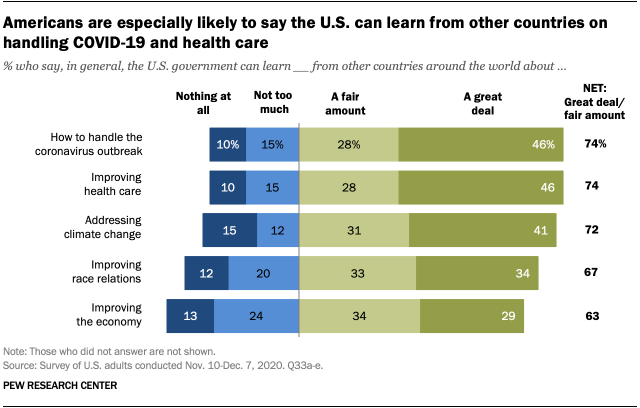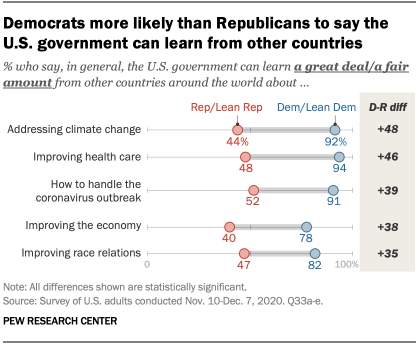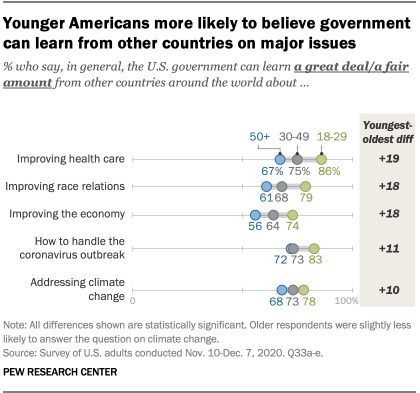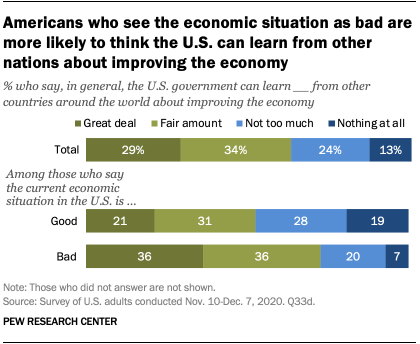Amid some of the darkest months of the coronavirus pandemic, Americans believe that the U.S. government can learn a lot from other countries around the world about handling the outbreak and improving health care domestically. And majorities say that the U.S. can learn at least a fair amount from countries around the world about other major policy issues, such as addressing climate change and improving race relations and the economy.

But attitudes on the value of lessons learned from other nations about policy issues remain partisan. Democrats and those who lean toward the Democratic Party are far more willing to say the U.S. can learn from other countries than are Republicans and those who lean Republican on all five issues asked about in the survey. Young Americans, who are generally more positive in their opinions of international organizations, are also more enthusiastic in saying the U.S. government can learn from other countries.
These are among the findings of a Pew Research Center survey of 1,003 U.S. adults conducted Nov. 7 to Dec. 10, 2020.
This analysis focuses on Americans’ views of what the U.S. government can learn from other countries on issues including the coronavirus outbreak, health care, climate change, race relations and the economy. This post also includes demographic analysis comparing responses to the questions by age, gender and party identification.
For this report, we used data from a nationally representative survey of 1,003 U.S. adults conducted by telephone from Nov. 10 to Dec. 7, 2020.
Here are the questions used for this report, along with responses, and its methodology.
When asked whether the U.S. government can learn from other countries on dealing with five major issues, a majority of Americans say the U.S. can learn a great deal or fair amount on each. Around three-quarters of Americans believe the U.S. government can learn a lot on handling the coronavirus outbreak and improving health care within the U.S., with only a quarter saying the government can learn not too much or nothing at all.
On dealing with climate change, 72% of Americans think that the U.S. government can learn from other nations, including 41% who think the U.S. can learn a great deal.
Smaller majorities say lessons from other countries would have value for improving race relations (67%) and dealing with the economy (63%) in the U.S.

There are major partisan divisions on whether the U.S. could look abroad for solutions to domestic problems. In all cases, Democrats are far more likely than Republicans to say that the U.S. can learn from other countries, with the biggest differences being on addressing climate change and improving health care. For example, 92% of Democrats say the U.S. government can learn a great deal or fair amount from countries around the world on dealing with climate change, but only 44% of Republicans say the same.
This comports with previous research on partisan divisions over the value of working with other countries to address COVID-19, with Republicans generally expressing more skepticism of international cooperation than Democrats. Still, four-in-ten Republicans or more say there can be some benefit to looking at other countries for solutions across each of the policy issues examined.

There are also significant age differences on the question of whether the U.S. can learn from other countries. Overall, while a majority of Americans in all three age brackets share the view that the government has a great deal or fair amount to learn from abroad on health care, race relations, the economy, the coronavirus outbreak and climate change, younger Americans are even more likely to hold this view. On improving health care, for example, 86% of Americans ages 18 to 29 think there is usefulness in learning from other countries’ experiences compared with 67% of Americans who are 50 and older.
While large majorities among both men and women think the U.S. can learn a great deal or fair amount about handling the coronavirus outbreak, women are more likely than men to express this view (78% vs. 70%, respectively). And 50% of women think the U.S. can learn a great deal from other countries on this issue, compared with 41% of men. Earlier research shows that women are generally more likely than men to report that the pandemic has changed their lives.
American women are also more likely than men to think the U.S. can learn from other countries on how to address climate change and improve the economy.

About six-in-ten adults (63%) say the U.S. can look to other countries for lessons on improving the economy. However, people who see the current economic situation in the U.S. as bad are more likely than those who see it as good to support the U.S. learning about improving the economy from other countries. For example, 36% of those with a negative economic outlook say the U.S. can learn a great deal from other countries, compared with 21% of those who say the economic situation is good.
Those who respond that they trust the U.S. government to do what is right for the country are more likely than those who do not trust the government to say the U.S. can learn from abroad on two major issues: addressing climate change and improving health care. About three-quarters (77%) of those who trust the national government think the U.S. can learn about combatting climate change from other countries, while 67% of those who do not trust the U.S. government agree.
Note: Here are the questions used for this report, along with responses, its full dataset and its methodology.

